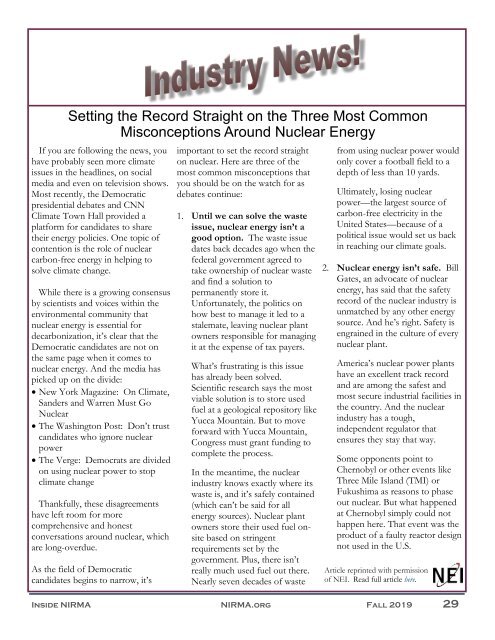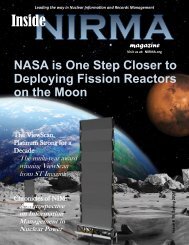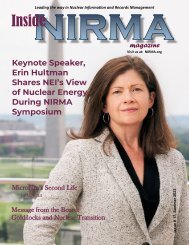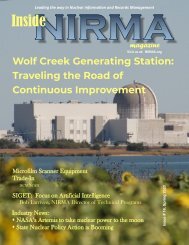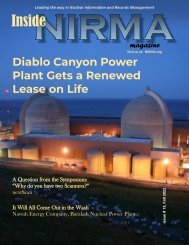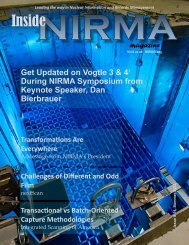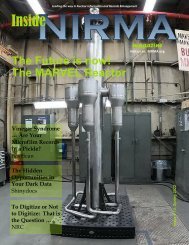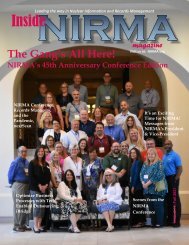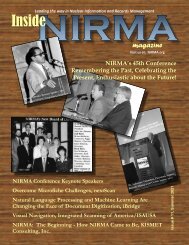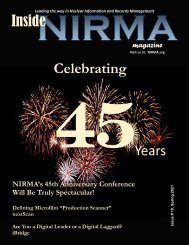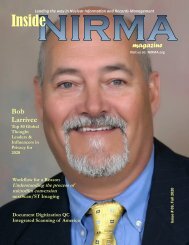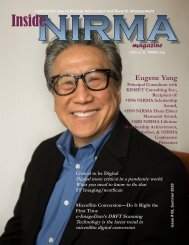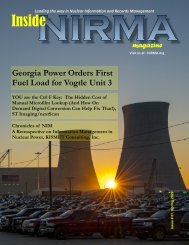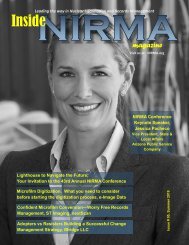Inside NIRMA Fall 2019 FINAL
You also want an ePaper? Increase the reach of your titles
YUMPU automatically turns print PDFs into web optimized ePapers that Google loves.
Setting the Record Straight on the Three Most Common<br />
Misconceptions Around Nuclear Energy<br />
If you are following the news, you<br />
have probably seen more climate<br />
issues in the headlines, on social<br />
media and even on television shows.<br />
Most recently, the Democratic<br />
presidential debates and CNN<br />
Climate Town Hall provided a<br />
platform for candidates to share<br />
their energy policies. One topic of<br />
contention is the role of nuclear<br />
carbon-free energy in helping to<br />
solve climate change.<br />
While there is a growing consensus<br />
by scientists and voices within the<br />
environmental community that<br />
nuclear energy is essential for<br />
decarbonization, it’s clear that the<br />
Democratic candidates are not on<br />
the same page when it comes to<br />
nuclear energy. And the media has<br />
picked up on the divide:<br />
• New York Magazine: On Climate,<br />
Sanders and Warren Must Go<br />
Nuclear<br />
• The Washington Post: Don’t trust<br />
candidates who ignore nuclear<br />
power<br />
• The Verge: Democrats are divided<br />
on using nuclear power to stop<br />
climate change<br />
Thankfully, these disagreements<br />
have left room for more<br />
comprehensive and honest<br />
conversations around nuclear, which<br />
are long-overdue.<br />
As the field of Democratic<br />
candidates begins to narrow, it’s<br />
important to set the record straight<br />
on nuclear. Here are three of the<br />
most common misconceptions that<br />
you should be on the watch for as<br />
debates continue:<br />
1. Until we can solve the waste<br />
issue, nuclear energy isn’t a<br />
good option. The waste issue<br />
dates back decades ago when the<br />
federal government agreed to<br />
take ownership of nuclear waste<br />
and find a solution to<br />
permanently store it.<br />
Unfortunately, the politics on<br />
how best to manage it led to a<br />
stalemate, leaving nuclear plant<br />
owners responsible for managing<br />
it at the expense of tax payers.<br />
What’s frustrating is this issue<br />
has already been solved.<br />
Scientific research says the most<br />
viable solution is to store used<br />
fuel at a geological repository like<br />
Yucca Mountain. But to move<br />
forward with Yucca Mountain,<br />
Congress must grant funding to<br />
complete the process.<br />
In the meantime, the nuclear<br />
industry knows exactly where its<br />
waste is, and it’s safely contained<br />
(which can’t be said for all<br />
energy sources). Nuclear plant<br />
owners store their used fuel onsite<br />
based on stringent<br />
requirements set by the<br />
government. Plus, there isn’t<br />
really much used fuel out there.<br />
Nearly seven decades of waste<br />
from using nuclear power would<br />
only cover a football field to a<br />
depth of less than 10 yards.<br />
Ultimately, losing nuclear<br />
power—the largest source of<br />
carbon-free electricity in the<br />
United States—because of a<br />
political issue would set us back<br />
in reaching our climate goals.<br />
2. Nuclear energy isn’t safe. Bill<br />
Gates, an advocate of nuclear<br />
energy, has said that the safety<br />
record of the nuclear industry is<br />
unmatched by any other energy<br />
source. And he’s right. Safety is<br />
engrained in the culture of every<br />
nuclear plant.<br />
America’s nuclear power plants<br />
have an excellent track record<br />
and are among the safest and<br />
most secure industrial facilities in<br />
the country. And the nuclear<br />
industry has a tough,<br />
independent regulator that<br />
ensures they stay that way.<br />
Some opponents point to<br />
Chernobyl or other events like<br />
Three Mile Island (TMI) or<br />
Fukushima as reasons to phase<br />
out nuclear. But what happened<br />
at Chernobyl simply could not<br />
happen here. That event was the<br />
product of a faulty reactor design<br />
not used in the U.S.<br />
Article reprinted with permission<br />
of NEI. Read full article here.<br />
<strong>Inside</strong> <strong>NIRMA</strong> <strong>NIRMA</strong>.org <strong>Fall</strong> <strong>2019</strong> 29


